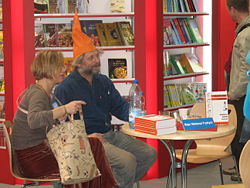- Major Waldemar Fydrych
-
Waldemar "Major" Fydrych (born April 8, 1953) is a Polish activist best known as the founder and leader of the Orange Alternative movement in Poland. He has been recognized worldwide for his numerous cultural actions and publications.
Contents
Early career
Fydrych was born in Toruń, Poland on April 8, 1953. He is a graduate of the History and History of Art Faculty of the University of Wroclaw. Fydrych began his independent public activity in the 1970s. He created in Wrocław a branch of the Independent Students Union (NZS) and launched the Movement for New Culture in the city. At this time, he was also one of the co-organizers of a massive peace march that took place in April 1981.
During the Martial Law, many Poles first made acquaintance with Fydrych's work through his picturesque dwarf images painted on building walls, covering up the paint that was used to cover up anti-regime slogans.
The Orange Alternative
Starting in 1986, he began organizing an endless chain of happenings, which were eventually named the "Orange Alternative." In March 1988, after distributing women's hygienic napkins on the street (an item missing then), he was arrested and sentenced by the Court of Justice to three months of imprisonment. He was released following general public uproar.
Nickname
At the time of the communist regime, when Fydrych was called upon to fulfill his military service obligation, he appeared before the army commission dressed in a uniform of a major. Unwilling to enter the army, he pretended the opposite, simulating madness. Asked to keep a different language in regard to his superiors, Fydrych began to address his interlocutor per "colonel," at the same time describing himself as a "major," a nickname which remained with him ever since.
Recent activities
Fydrych, alongside a group of students, participated in the Orange Revolution in Ukraine organizing events in Poland and Ukraine. He and the students made in the streets an "Orange Scarf" of support for the revolution. This scarf was started in Warsaw by one of the icons of the Orange Revolution - famous Ukrainian singer Ruslana Lyzhichko. On the night of the "Orange Victory," the 15-meter long scarf was handed by Lyzhichko to President Yushchenko as one of the main symbols of the brotherhood between Ukraine and Poland.
In 2002, Fydrych presented himself in elections to the post of the Mayor of the City of Warsaw. He also ran for mayor of Warsaw in 2006 elections, gaining 2914 votes (0,41%). His organization was Dolts and Dwarves (Gamonie i krasnoludki).
Honors and awards
- 1988 Solidarity Award of Puls in London.
- 1988 Award of Polkul in Australia.
- In June 2005, Fydrych and the Orange Alternative movement were honored by an exposition held at the European Parliament in Brussels.
- Four films have been produced and aired on Polish public television, including a documentary on the Orange Alternative and the Orange Revolution.
Publications
- Fydrych, W. Hokus Pokus
- Fydrych, W. The Lives of the Orange Men
- Fydrych, W. Dwarves & Dolts
- Fydrych, W. The Orange Alternative - Revolution of Dwarves
Quotes
- "In Poland there are only three places when you can feel free: in churches, but only for the meditations, in prisons, but not everyone can go to prison, and on the streets - they are the freest places."
- "The Western World will find out much more about the situation in Poland from hearing that I was put to jail for giving tampons to a woman, than from reading the books and articles written by other people from the opposition."
- "Can you treat a police officer seriously, when he is asking you the question: 'Why did you participate in an illegal meeting of dwarfs?"
See also
External links
- Brief biography on the Orange Alternative website (based on the doctoral thesis Nicole Gourgaud, Université de Lyon – November 1993)
Categories:- 1953 births
- Living people
- People from Toruń
- Polish activists
Wikimedia Foundation. 2010.

